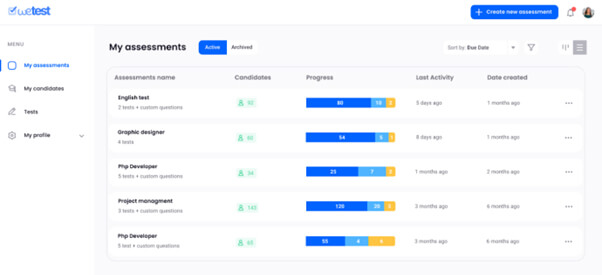IQ vs. Skill: Which One Is Important
for Employment and How to Measure Them
See also: Transferable Skills
The job market is competitive. It isn’t enough to have skills and a work ethic. Nor does a high IQ score guarantee success in the job market, Dr. Satoshi Kanazawa, a social psychologist, says hiring skilled workers is better. So, what’s a good intelligence quotient score?
This article will tell you all about it and how to make your job hunt more successful!

What is IQ?
IQ is a score derived from standardized intelligence tests. IQ measures an individual's cognitive abilities, including reasoning, information processing, and memory. IQ tests are conducted by licensed professionals or companies that provide validated IQ tests.
IQ tests are designed to test intelligence using age-appropriate items and scoring methods. Tests for individuals ages 6 to 16 are geared toward developing cognitive skills, especially those related to reading and math. Tests for individuals aged 17 and older are more complex and are designed to test problem-solving skills, pattern recognition, mathematical logic, and finding connections among verbal concepts.
IQ doesn't rely on a person's general knowledge of facts and figures but on problem-solving skills. As such, the test can identify people with high cognitive abilities regardless of their social background or socioeconomic status. However, individuals with high IQs can also have other skills, such as artistic ability or leadership potential. Therefore, it is crucial to assess each individual's capabilities in addition to their IQ score when making hiring decisions.
Different ranges of IQ classification
IQ stands for intelligence quotient and is a score used to measure mental ability. It is determined through standardized test scores and compared to the average scores of people in the same age group. IQ tests typically measure verbal and non-verbal intelligence, such as logic skills, problem-solving, and spatial abilities. However, they can also test other intellectual domains, such as visual perception or abstract thinking. IQ classification is the practice used by test publishers to designate test score ranges into categories, such as “superior” and “average.”
Group differences in IQ scores have been observed and discussed in the scientific literature, but the current consensus is that these differences are due to environmental rather than genetic causes. Still, further research is needed to understand the factors contributing to individual intelligence differences fully.
Average IQ score for different age groups
IQ scores tend to remain stable after early adulthood and can generally be correlated with scores taken at younger ages. It is important to remember, however, that IQ test performance is known to vary across age groups and that it is not appropriate to directly compare an individual's performance in one age group to another. For example, an individual may score high on an IQ test as a teenager but may score lower as an adult. This variability in test performance across age groups is because intelligence tends to decline with age after early adulthood. In contrast, fluid intelligence generally remains intact throughout adulthood. Average IQ scores for different age groups can be found below:
IQ is the No. 1 predictor of work success
Intelligence is the primary determinant of job performance, according to Schmidt and Hunter (2000). IQ scores are a good indicator of an individual's occupational group but not the specific occupation they will end up in.
IQ is an essential predictor of career success and higher salaries due to its strong correlation with job performance.
Heritability of IQ is 0.45 for children and rises to around 0.75 for late adolescents and adults. While IQ correlates with career success and wealth, it is not necessarily associated with happiness.
The relationship between intelligence and job performance cannot be entirely explained by either genetic or environmental factors. Therefore, employers should not solely rely on IQ tests to determine hiring eligibility, as other factors like cognitive abilities, emotional intelligence, and job skills can help predict work performance.
Is a high IQ score all you need to get a job?
IQ is considered the minimum requirement to get a job, but other skills are required to be successful in the long run. For example, a high IQ score doesn't guarantee someone can learn new skills and abilities quickly.
Cognitive aptitude tests are a better alternative than IQ tests. Companies can identify potential job candidates with strong cognitive abilities and skills. These tests help assess a person's intelligence across multiple domains. A higher IQ score only tells part of the story of someone's intelligence or ability.
IQ tests are primarily used in education and psychology to identify gifted individuals and those who need special assistance. However, they can also measure the general intelligence of people who need access to sophisticated testing environments. Though they are essential for various reasons, it's important to note that a high IQ score only accounts for 4-9% of job performance. Therefore, cognitive ability alone cannot determine success in any profession.
What is IQ versus hard work?
You may have heard of the IQ debate, which is a common discussion topic among people. Many believe that intelligence quotient (IQ) is the sole determinant of success, while others believe that hard work is the key to success. Of course, both are right in their ways, but there is no denying the fact that both these skills are vital for career progression.
In today's world, job performance depends on cognitive abilities such as intelligence and problem-solving skills. Therefore, hiring managers prefer candidates with high IQ scores as they are seen to have higher cognitive skills. However, other factors like emotional intelligence also contribute to job performance.
Working hard on increasing skills will improve your IQ score.
Working hard on increasing skills will help improve your intelligence quotient (IQ). For example, it's crucial to practice memory activities, such as jigsaw puzzles and sudoku, which help improve different aspects of IQ. Playing games that require higher-order reasoning skills may also help sharpen intellectual abilities. Other activities that may help increase IQ scores include developing the ability to understand relationships and associations. These skills may help individuals gain a broader understanding of the world around them and can lead to an improved IQ score.
As intelligence continues to be studied and measured, it is essential to remember that intelligence is a complex trait with many contributing factors. Therefore, it is important not to overgeneralize results from one study or assessment and to see intelligence as a continuous trait with many different levels.
It's better to employ skilled workers rather than smart ones
Skill tests can accurately measure cognitive ability and job-related skills, which are vital for hiring qualified workers. For example, a skills test can assess a candidate's proficiency in computer usage, math, writing skills, and other necessary abilities to determine if the candidate is qualified for the job.
Psychometric tests can be used to test for personality traits like intelligence and creativity. In addition, these tests can ensure that candidates are a good fit for the position by testing for the desired personality traits and cultural fit.
Structured interviews help to understand candidates on a deeper level and evaluate their skills and abilities. In addition, these interviews allow candidates to discuss their experience and qualifications. These methods help employers to make informed hiring decisions that reflect each candidate's experience, skills, and abilities.
Screening tests help to identify the best candidates, making the hiring process faster and easier. In addition, emotional intelligence has been linked with job success and higher productivity, so it is essential to understand and develop both skills and emotional intelligence for successful hiring.
How to measure IQ: online IQ tests
IQ tests are designed to measure intelligence and can be used for adults and children. Some standard IQ tests include the Stanford-Binet Intelligence Scale, Wechsler Adult Intelligence Scale, and Woodcock-Johnson Tests of Cognitive Abilities. These tests are designed to assess intelligence in various age groups.
Other tests, such as the Emotional Intelligence Test and the Diagnostic Analysis of Nonverbal Accuracy, measure emotional intelligence.
Online IQ tests such as the Raven’s Progressive Matrices and Situational Tests of Emotional Management are also available to measure one's IQ. These tests are convenient and easy to use but cannot be used to diagnose intelligence levels.
Overall, no perfect test can accurately measure one's intelligence level. However, various tests can accurately estimate one's intelligence level.
How to test skilled employers: online employment tests
IQ tests are popular for pre-employment testing as they give an accurate and reliable picture of a job applicant's intelligence. However, they should be specifically tailored to the job role to avoid discrimination claims.
Employers can use online pre-employment assessments to save time and hire the best candidates. Pre-employment tests help them understand if applicants have the skills required for the job.
Cognitive aptitude tests, role-specific skills tests, and personality and culture tests help employers better assess the best fit for their company rather than relying solely on IQ tests. Employers can find the best advice in pre-employment testing by subscribing to newsletters or browsing job websites.
Employers should consider using virtual recruitment ideas like online assessments to attract talent online. WeTest is one of the best pre-employment tests you can take online.

Conclusion
Learning new skills and adapting to ever-changing circumstances is vital for success as a job candidate or employee. IQ, however, is just one part of the equation. Hard work and skills are equally important. So if you have the skills but not the intelligence, maybe you won’t land the job. Besides, even high intelligence won’t help you cut it in the long run if you don't work hard enough. On the other hand, working hard on increasing skills will improve your IQ score over time and give you a higher chance of success in any field.
About the Author
This article was written by Tom Siani.
